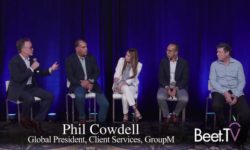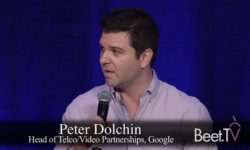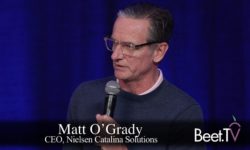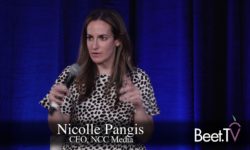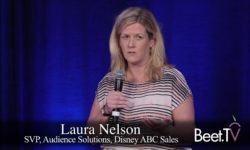SAN JUAN, Puerto Rico—Some of the most frank discussions at the annual Beet Retreat often happen in one-on-one sessions. Such was the case this year in various fireside chats titled Setting the Aperture for a Consumer-Centric TV, including a frank discussion about advanced television between Adam Gerber and Dave Clark.
The short summary of their back and forth would be that from a cross-platform perspective, TV is still “a mess” and that despite much talk about industry collaboration among competitors, reality is bound to intrude when companies like Comcast and Disney wage their inevitable marketplace battles.
Gerber has been on the sell- and buy-side and is currently President of Global Media Investment for GroupM’s Essence agency. Clark is EVP of Advanced Advertising at Comcast & GM of FreeWheel.
In trying “to make supply make sense,” Comcast has scooped up no fewer than five companies—from FreeWheel to STRATA, under the FreeWheel brand—with the overarching goal of unifying linear and digital by removing a lot of the fragmentation and friction among the tv infrastructure, working on addressable technology, decisioning, and making life easier for marketers at the end of the day. The competitive backdrop is the ease of use of such platforms as Amazon, Facebook and Google.
“Whether you’re a programmer or you’re a marketer, you cannot run one campaign across TV. You cannot have it optimized in real time, you cannot get a report. You have to go hire an army of people to do that,” Clark observed.
This is why “television is not a platform…it is hundreds of sales teams, different ways of selling depending whether you’re local or national, measurement’s all over the place.”
As for Amazon, Facebook and Google, “Yes they’re walled gardens but they are unified tech and data platforms and they can bring sort of a seamless solution to marketers there’s no question about that. TV is not that,” said Clark. “Programmers are unified in wanting one campaign across linear and digital environments, which FreeWheel serves against all–including STB VOD–so that programmers can have everything unified.”
Never one to beat around the bush, Gerber put aside digital/linear unity for the more timeless question of competitive media selling, particularly as it pertains to national TV avails. “The fact of the matter is, most inventory still trades in television in a traditional unit linear model and it’s controlled by independent sellers,” said Gerber. “I care about the national avails that the national networks control because that’s where the bulk of viewing occurs. I need that brought together with the local avails, with the digital avails, everything together on one platform like you said with Google and Facebook. I don’t see that happening.”
Clark recalled when TiVo launched in 1995 and some people predicted “this is the end of television, it’s all going to change.” From his vantage point close to technology, he likened the state of affairs as “driving towards a mountain on the horizon, it doesn’t look like you’re ever getting close to it and then one day it’s right in front of you. There are massive investments right now going into the technology needed to clean this up.”
Gerber: “Who’s your competitor? Are you guys all going to work together to help us figure this out? Are you all going to compete with each other?”
This is where reality intruded. Just one day before, it was announced that Disney had chosen Google over FreeWheel to handle its digital advertising, as Advertising Age reports.
“They make the decisions that are in their best interests of course,” said Clark. “It’s undeniable that Google now has a massive beachhead in the industry. There’s no question about it.”
This video was produced in San Juan, Puerto Rico at the Beet.TV executive retreat. Please find more videos from the series on this page. The Beet Retreat was presented by NCC along with Amobee, Dish Media, Oath and Google.







